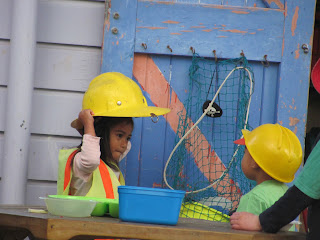Teina / Tuakana
Young children engage in powerful learning through
their relationships with others and their environment. Often children learn new knowledge or skills by
being taught by another person who is more experienced at the task, or holds
more knowledge of a subject. Being taught by a more-experienced person is a
Maori theory Teina / Tuakana (which
means, literally, an older person helping / teaching someone younger).
Teina /
tuakana can take many forms, such as:
* between same-aged peers
* between different aged
children
* between adults and children.
* teachers also learn a lot from the
children and families
Each individual who is part of our kindergarten
community has knowledge that can be imparted and guide others for learning.
We notice
a lot of teina / tuakana at our kindergarten each day. Some skills that are developed
through teina / tuakana are based on responsibility...
(taken from “How
children learn responsibility - Teina –tuakana” by Dr A. Meade and N.
Grazier)
Te whai takohanga
- having
responsibility
- having designated
roles and positions of responsibility.
For
example, Fadila and Lilivasarosa showed other children how to wipe our tables for preparation
for lunch time.
Another
example is when Harry showed children at mat time how to do exercises.
Te mouri takohanga
- being responsible
- refers to an
individual’s attitude and actions
For
example, children remind teachers that the GO sign by the front door needs
changing to the STOP sign. It's great that children learn and remember our rules.
Te kawe takohanga
- taking
responsibility
- is about courage,
risk-taking, having a go, trying new things.
For
example, some children need help to walk across the balancing beam.
Some children offer help by role modelling to how to balance, others hold another child's hands and some give verbal encouragement.
Te tuku takohanga
- sharing
responsibility
- is about
relationships, interaction and engagement with others, sharing power, and asking
for and providing assistance.
For
example, often children ask teachers to help swing them on the swings. Lucas could see that a teacher was busy at that moment, so he said he would help Harper swing. The two of them had fun as Lucas swung Harper. Lucas then showed Harper how to swing his legs up and down so he could learn to do so independently. "It's easy!" said Lucas, and Harper laughed as he swung.
Another example is when a child is new and transitioning into kindergarten, other children are happy to be the expert and support newcomers. Kyle and Juri are friends outside of kindergarten. Kyle has kindly taken Juri under his wing as she gets used to her new environment.
We are excited
to see children learning from one another, from adults and the wider community.
We too, enjoy learning from everyone. We will continue to support tuakana /
teina learning by recognising anyone taking or sharing responsibility by acknowledging and describing the helpful behaviours. Describing
positive behaviours helps enrich children’s vocabularies, and reinforces to
children social expectations about relating to each other.









